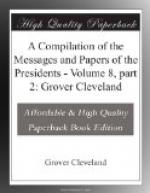The long-pending controversy between this Government and that of Chile touching the seizure at Sitana, in Peru, by Chilean officers, of a large amount in treasure belonging to citizens of the United States has been brought to a close by the award of His Majesty the King of the Belgians, to whose arbitration the question was referred by the parties. The subject was thoroughly and patiently examined by that justly respected magistrate, and although the sum awarded to the claimants may not have been as large as they expected there is no reason to distrust the wisdom of His Majesty’s decision. That decision was promptly complied with by Chile when intelligence in regard to it reached that country.
The joint commission under the act of the last session for carrying into effect the convention with Peru on the subject of claims has been organized at Lima, and is engaged in the business intrusted to it.
Difficulties concerning interoceanic transit through Nicaragua are in course of amicable adjustment.
In conformity with principles set forth in my last annual message, I have received a representative from the United States of Colombia, and have accredited a minister to that Republic.
Incidents occurring in the progress of our civil war have forced upon my attention the uncertain state of international questions touching the rights of foreigners in this country and of United States citizens abroad. In regard to some governments these rights are at least partially defined by treaties. In no instance, however, is it expressly stipulated that in the event of civil war a foreigner residing in this country within the lines of the insurgents is to be exempted from the rule which classes him as a belligerent, in whose behalf the Government of his country can not expect any privileges or immunities distinct from that character. I regret to say, however, that such claims have been put forward, and in some instances in behalf of foreigners who have lived in the United States the greater part of their lives.
There is reason to believe that many persons born in foreign countries who have declared their intention to become citizens, or who have been fully naturalized, have evaded the military duty required of them by denying the fact and thereby throwing upon the Government the burden of proof. It has been found difficult or impracticable to obtain this proof, from the want of guides to the proper sources of information. These might be supplied by requiring clerks of courts where declarations of intention may be made or naturalizations effected to send periodically lists of the names of the persons naturalized or declaring their intention to become citizens to the Secretary of the Interior, in whose Department those names might be arranged and printed for general information.




